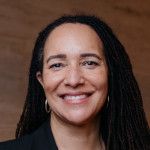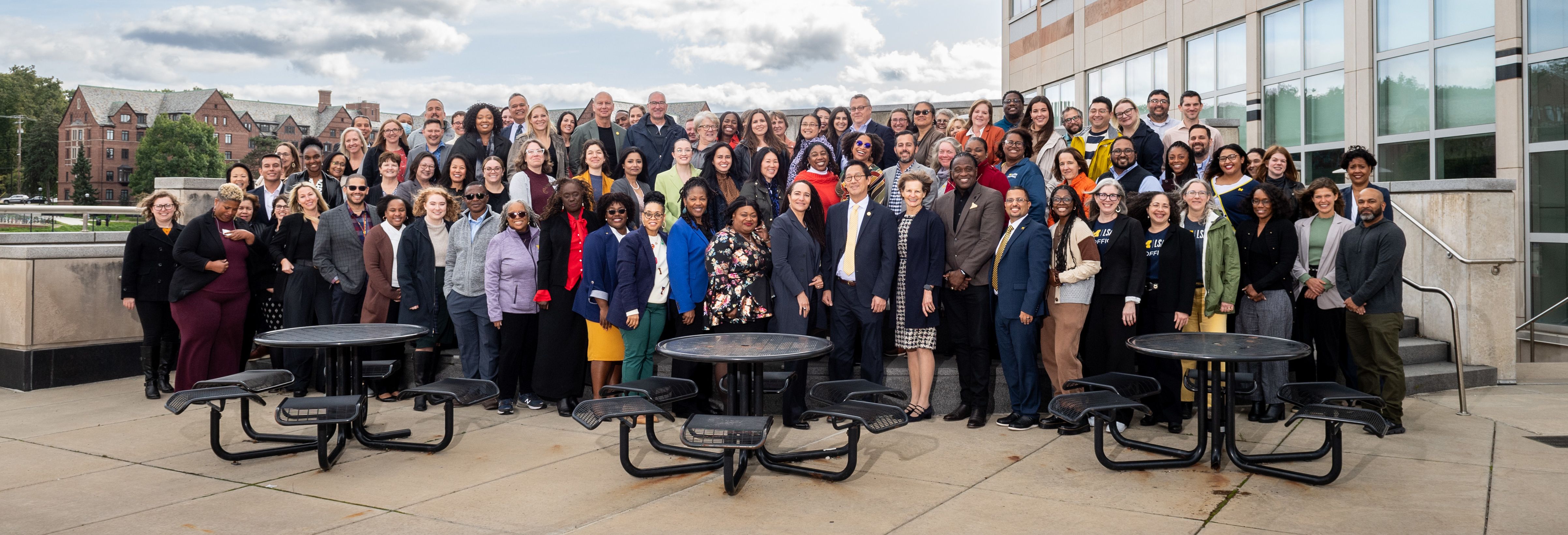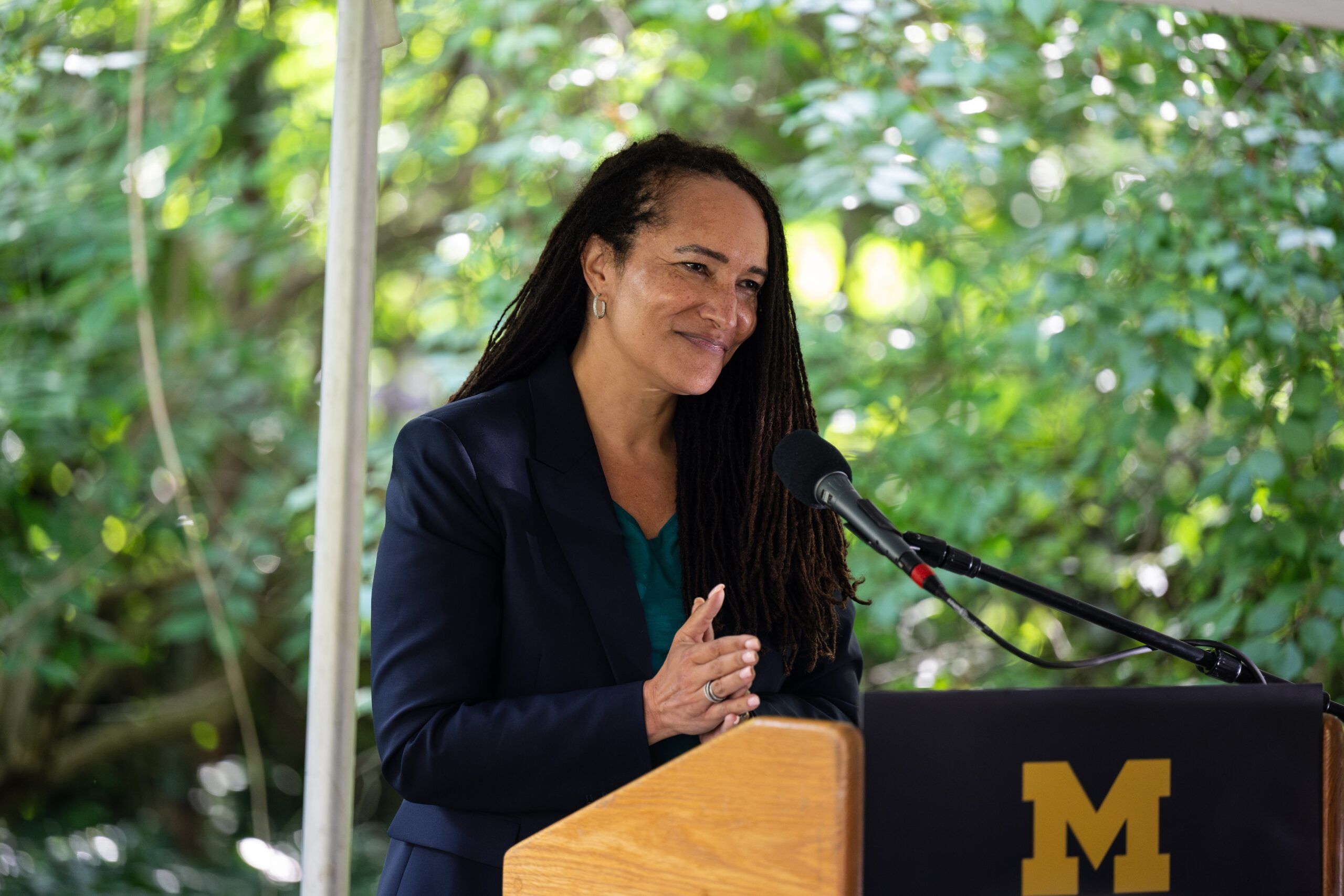A Guiding Force for Organizational Change
From the outset, it was clear that achieving the comprehensive goals set forth in DEI 1.0 would require fundamental and at times seismic shifts in the university’s organizational culture. It was equally clear that implementing and sustaining such massive and pervasive culture change would require exceptional leadership on an institutional level, along with a new infrastructure to provide ongoing administrative and operational support.
In 2016, the university began assembling a DEI leadership team by appointing senior faculty member Robert M. Sellers to serve in the dual posts of Vice Provost for Equity and Inclusion and Chief Diversity Officer (2016-2022), and Katrina Wade-Golden, Associate Vice Provost and Deputy Chief Diversity Officer (2016-present). In August 2022, the university appointed Vice Provost for Equity and Inclusion and Chief Diversity Officer, Tabbye M. Chavous.
Throughout the entire span of DEI 1.0 implementation, the strong and innovative leadership of these individuals and their staff has made it possible for the university to enact far-reaching foundational change at every level, in every unit, in ways that have impacted every individual on campus. Their collaborative efforts and strategic interventions also enabled the U-M community to successfully navigate an array of challenges and crises that included the COVID-19 pandemic, violent political unrest and a nationwide racial reckoning.
Tabbye Chavous, Vice Provost for Equity and Inclusion & Chief Diversity Officer

As a faculty member of the University of Michigan for 25 years, Tabbye Chavous has served in a variety of leadership roles at department, college and central administration levels. Prior to her appointment as Vice Provost for Equity and Inclusion and Chief Diversity Officer in August 2022, Chavous was director of the National Center for Institutional Diversity (NCID). Previously, she served as chair of the U-M’s Combined Program in Education and Psychology (CPEP), as associate dean of academic programs and initiatives at the Rackham Graduate School, as associate vice president for research in the Office of the Vice President for Research, and as associate dean for DEI in the College of Literature, Science, and the Arts (LSA). She is also co-founder and principal investigator of U-M’s Center for the Study of Black Youth in Context.
As Vice Provost and CDO, Chavous noted that the DEI 1.0 Strategic Plan has raised institutional awareness and increased expectations and standards for diversity, equity and inclusion campuswide by aligning policies, procedures and processes with DEI principles. Among her immediate goals is applying the knowledge gained and lessons learned in the initial five DEI plan years for even greater impact moving forward in the implementation of DEI 2.0. In doing so, a key priority is collaborating with campus leaders and community members in building on, refining and sharing successful models and practices; addressing gaps; setting priorities, and launching transformative plans and initiatives.
Katrina Wade-Golden, Associate Vice Provost and Deputy Chief Diversity Officer

Since her appointment in 2016, Katrina Wade-Golden provides crucial administrative leadership, facilitates plan implementation in all 51 units, and serves as an advisor to the more than 100 DEI implementation leads campuswide. Dr. Katrina Wade-Golden is Deputy Chief Diversity Officer within the Office of Diversity, Equity & Inclusion (ODEI), as well as Director of Implementation for the Campuswide Diversity, Equity & Inclusion Strategic Plan. She brings over 25 years of administrative and research experience working with complex longitudinal datasets and has broad expertise leading research and strategy engagements in the corporate, higher education, and non-profit sectors, utilizing a wide range of qualitative and quantitative techniques. Dr. Wade-Golden possesses particular expertise in the areas of measurement, questionnaire design, social psychology, organizational dynamics, institutional diversity, and complex data analyses.
She has published numerous articles, essays, monographs, and reports in these areas, and has published a book (2013), The Chief Diversity Officer: Strategy, Structure, and Change Management (co-authored with Damon A. Williams), that chronicles the work of an ongoing research project focused on Chief Diversity Officers at nearly 800 institutions across the country, and is the first publication to fully explicate the role of chief diversity officers in higher education.
Assistant Vice Provosts for Equity, Inclusion & Academic Affairs

Marie P. Ting has dedicated her extensive career to advancing diversity, equity, and inclusion (DEI) within higher education. Her rich experiences span various institutions, where she has collaborated with faculty, staff, and student communities to foster inclusive environments. Currently serving as the Assistant Vice-Provost for Equity, Inclusion & Academic Affairs, Marie previously held the role of Associate Director at the University of Michigan’s National Center for Institutional Diversity (NCID). Her career also includes key positions at the Center for Educational Outreach (CEO) and the Office of Academic Multicultural Initiatives (OAMI).
Additionally, she has been the University Director of Student Affairs and Special Programs at the City University of New York (CUNY) system office and has worked in both academic and student affairs at the University of Maryland, College Park. An instructor and mentor, Marie has actively engaged in university and community service to further DEI initiatives at both local and national levels.
Her research interests, publications, and presentations concentrate on higher education organizational behavior, the campus racial climate, and the creation of inclusive spaces for communities of color, with a particular focus on the unique challenges faced by Asian Pacific Islander American communities.

Deborah S. Willis is a passionate, enthusiastic administrator, educator, and certified executive leadership coach trained at Georgetown University’s Institute for Transformational Leadership. As an Assistant Vice Provost for Equity, Inclusion and Academic Affairs, she works with the leadership team to develop strategy and tactics that lead to institutional transformation. Her role has a student focus, and she closely partners with leaders campuswide, including the Division of Student Life, to optimize the comprehensive student experience at Michigan. She currently leads and facilitates numerous dialogues, workshop sessions and programs that encourage an inclusive and equitable community.
Prior to her current role, Dr. Willis served as an Assistant Director for Professional Development and Engagement at Rackham Graduate School and led the Rackham Professional Development DEI Certificate, an innovative program that she designed to prepare scholars to work in a diverse environment while fostering a climate of inclusivity. She also designed and currently leads U-M’s Alumni M-Pact DEI Certificate in collaboration with the Alumni Association of the University of Michigan. The program expands the mission and core values of the University of Michigan through its alumni by providing actionable steps to bring about positive change to communities and organizations globally.
Dr. Willis has over twenty years of impactful leadership in higher education. Throughout her professional career, she has provided vision and advocacy in the areas of diversity, equity, inclusion, social justice and leadership development. Her engaging style of collaboration and coaching encourages progressive, actionable and tangible growth for the people she serves. She is committed to creating initiatives that support an inclusive community and promote institutional change. When she is not working, she enjoys spending time with her husband and two adult children, exploring nature, and listening to music. Dr. Willis holds a Ph.D. in Sociology from the University of Michigan and is a proud Wolverine.

Catalina Ormsby is a leader and administrator with over two decades of experience at the University of Michigan (U-M). She has occupied diverse roles, collaborating closely with colleagues, faculty, students, and staff across all schools and colleges. As a social justice educator and DEI consultant, Catalina has been a pioneer in addressing emerging DEI topics on campus and beyond. Additionally, Catalina teaches a graduate course on Dialogue and Social Justice for the School of Social Work, enhancing campus climate efforts.
Most recently, she served as Associate Director at the Center for Educational Outreach (CEO), fostering communities of practice for faculty and scholars interested in DEI and student success influencing impact and policy changes. Her strategic collaborations across U-M and nationally demonstrate her leadership and impact in higher education, as she has spearheaded initiatives to advance DEI goals and increase access for underserved student populations. Through her roles, Catalina actively contributes to the growth and connectivity among communities of color at U-M. She is the founder and chair of the Professional Latinx at U-M Alliance (PLUMA), a proud native Colombian and a first-generation student. She holds a master’s degree from the University of Michigan’s Ford School of Public Policy and a bachelor’s degree with honors (summa cum laude) from Eastern Michigan University’s Business School.
DEI Implementation Leads

With the launch of the Diversity, Equity and Inclusion strategic plan in 2016, the University of Michigan sought to establish overarching strategies and guidelines that would better embed this work across the University.
While striving to build a more welcoming and inclusive environment, University leadership recognized that in order for the strategic plan to be successful, it could not be prescriptive, with all students, faculty, and staff tasked with the same work. The University acknowledged that each school, college and unit were at various points in their DEI efforts, and trying to use a “one size fits all” approach would not be an effective tactic.
Instead, the strategic plan aimed to provide a framework, while the tactical implementation of these efforts needed to be uniquely tailored to every unit at U-M. In creating individualized strategic plans, every school, college and unit was given a certain level of autonomy in developing their programs, staffing and executive leadership, all with the goal of imbuing DEI across the University.
A critical component to this approach was the development of the DEI Implementation Leads Group, better known as “DEI Leads.” These individuals are charged with ensuring that the 51 school, college and unit plans are executed within their respective areas. With at least one designated faculty or staff member for each of the 51 plans, they are responsible for augmenting and tracking the DEI work occurring within their unit. Leads report their progress and strategies with respective unit leadership as they develop and execute their plans. ODEI coordinates a monthly community of practice space - DEI Implementation Leads meetings - where the group comes together to share practices and models, engage in ongoing professional development, receive guidance in evaluation and assessment, and other efforts to support effectiveness and efficiency. The leads shepherd the work forward, track its efficacy, and work closely with one another.
